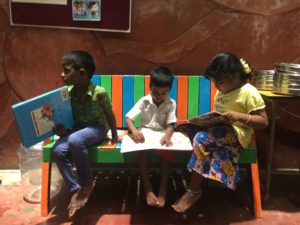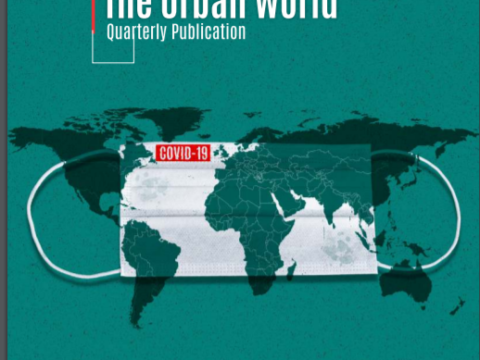as penned by Sharana’s board member Mrs. Alo.

“Late August, given heavy rain and sun
For a full week the black berries would ripen.”
“300 days to go” that’s what some of us dared to write on the blackboard on the first day of a new session. We referred of course to the holidays. The long summer break becomes intrinsic to your body clock and I echo the sentiment of many when, decades after graduation and working in the “Holidays”, many of us ask ourselves “why am I at my desk?”. As students, from those who spend time looking out of the window during lectures, to the nerd who thrives in pressure and complexity, the common thread that binds them is the ever approaching though sometimes crawling period of the summer holidays.
 “(…)
“(…)
You ate that first one and its flesh was sweet
Like thickened wine: summer’s blood was in it
Leaving stains upon the tongue and lust for
Picking.”
Holidays are several types, getting an away from a home experience, staying at home and enjoying the idea of doing “nothing” or dividing the day between fun and activity, helping around the house and harmless idling. But in the context of our children at Sharana, the holidays often mean work, an extra hand, some extra income and no real respite. The summer camp is a gargantuan logistical arrangement and network that for a few years systematically made batches of children divided in age groups and gave them a highly intensive activity infused week away from home experience in the holidays. The advantages of this residential camp implied a round the clock interaction with the children where care and observation was more minute and accompaniment more continuous. It ensured that the children did not work and received healthy wholesome meals and they could take a genuine break from the routine of both home and school.

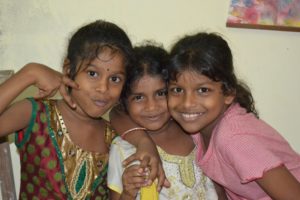
“We trekked and picked until the cans were full,
Until the tinkling bottoms had been covered (…)”
But as has been our work philosophy we got indications that the residential model needed a rethink. Cultural sensitivity made us realise that this format reduced potential participants as many parents were not fully comfortable with overnight stays and other cultural factors. We also realised the time was right for the families to take partial responsibility of the holiday period and time management of their children. So, this year we have done away with our old model. The children instead come to our office after breakfast at around 9.00 am and leave for their homes in the late afternoon. Our entire staff has mobilised in organising a wide variety of activities. They receive two healthy snacks and an extremely good quality nutritious lunch.


“Our hands were peppered
With thorn pricks, our palms sticky as Bluebeard’s”
These days the office is abuzz with laughter, voices, singing, dancing, projections, games, shared meals, artwork and book reading. Awareness sessions on child rights, safety, safe usage of LPG stoves and other practical guidance are given. An important session of educating the children on snakes was held. India has venomous and non-venomous varieties of snakes and many are endangered so it was crucial that the children learn to identify snakes and take appropriate measures instead of killing them or unnecessarily becoming victims of snake bites. Many other activities are in the pipeline and the most gratifying aspect of the new non-residential format is a spike in numbers and every child receiving these enriching sessions throughout the length of their vacations. The average attendance per day is 100.


“We hoarded the fresh berries in the byre.
But when the bath was filled we found a fur,
A rat grey fungus, glutting on our cache
The juice was stinking too.”
Our village centre too has a similar ongoing programme. In the village scene subtle changes in family structures has made it inconvenient for some parents to keep vigil or keep their children occupied in safe, recreational or constructive activities. Sharana responded to this request and a summer camp for 50-60 children every day is underway.

At Sharana we are convinced that this model of the summer camp is central for the academic calendar of the children. A fulfilled, safe, educative, collective day in the organisation with our dedicated staff and resource persons along with shared time with the families is beneficial to the growth of our children both mentally and emotionally.

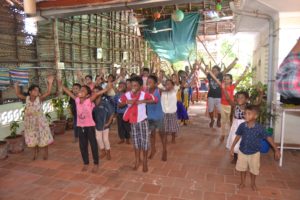
“(…)
I always felt like crying. It wasn’t fair
That all the lovely canfuls smelt of rot.”
Finally, probably the best measure of the importance and imprint of well spent holidays is our own memories from childhood. I remember the tree climbing, the board game playing, the chitchatting the outings and picnics, the experiments with cooking and the wind in the green paddy fields…the holidays were the best classrooms by far so is it our attempt with our summer camps.
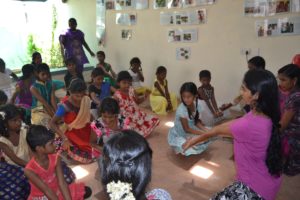

“Each year I hoped they’d keep, knew they would not”
Thoughts on the summer camp and what holidays mean to children woven around the tactile, perfumed taste filled imagery, excitement and mess of the brilliant childhood echo “Black Berry Picking”, by Seamus Heaney
